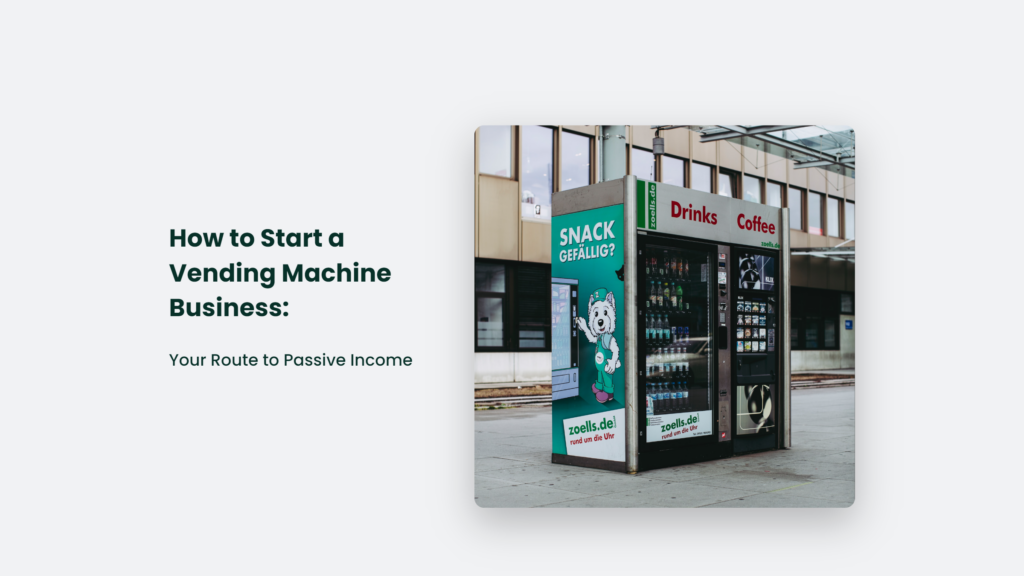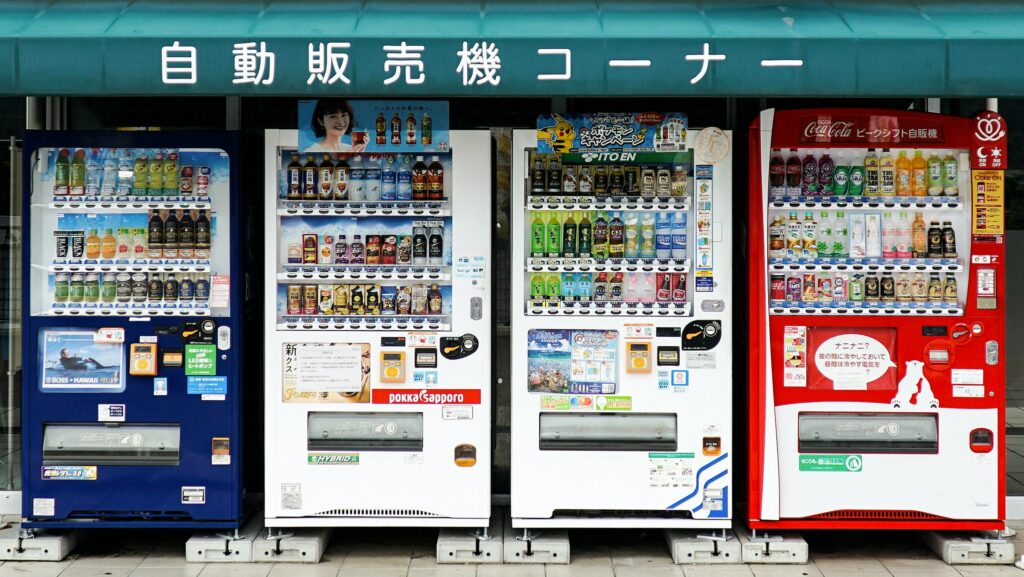Have you ever found yourself standing in front of a vending machine, coins in hand, contemplating the vast array of snacks and drinks? Ever wondered, “What if I owned one of these?” Well, you’re not alone. The vending machine business is a multi-billion dollar industry, and it’s not just about chips and soda anymore. From healthy snacks to electronics, the possibilities are endless. But how do you start a vending machine business? Let’s dive in.

How to Start a Vending Machine Business:
Starting a vending machine business involves several key steps, including choosing a profitable niche, finding an ideal location, and selecting the right suppliers. Here’s a step-by-step guide to help you get started:
Step 1: Choose Your Niche
The first step in starting a vending machine business is deciding what type of products you want to sell. It could range from food and beverages to tech products or specialty items like laundry detergent packets or school supplies. The choice of product is essential for the success of your vending machine business.
Step 2: Find the Right Location
The next step is finding a good location or a vending route for your machines. It could be in high-traffic areas like schools, offices, or shopping centres. When choosing a location, consider factors like foot traffic, the presence of other vending machines, and the preferences of the people who frequent the area.
Step 3: Source Your Products
Once you’ve chosen your niche and found a location, you’ll need to source your products. You can get your products from four main sources: wholesalers, brokers, cash and carry suppliers, and membership clubs. It’s important to shop around and negotiate with multiple suppliers to get the best prices and maintain good margins.
Step 4: Stock Your Machines
After sourcing your products, you’ll need to stock your vending machines. It’s best to stock your machines with items that are in high demand. Products from popular brands that customers already know and trust are the easiest to sell.
Step 4: Stock Your Machines
After sourcing your products, you’ll need to stock your vending machines. It’s best to stock your machines with items that are in high demand. Products from popular brands that customers already know and trust are the easiest to sell.
Step 5: Maintain Your Machines
Maintaining your vending machines is crucial for the success of your business. It includes keeping the machines clean, ensuring they’re in good working order, and regularly restocking them with products.
Step 6: Handle the Legalities
Every city has different restrictions when it comes to vending machines. You’ll likely need all or some of the following permits to get started: a beverage license, a food service license, a health inspection, and other licenses and permits that come with running any business, such as getting a seller’s permit, state or federal licenses, registering your business name, and applying for an Employer Identification Number (EIN).
Step 7: Monitor and Adjust
Once your vending machine business is up and running, monitoring your sales and adjusting your product offerings as needed is important. Pay attention to what items are selling well and which aren’t, and adjust your inventory accordingly.
Starting a vending machine business can be profitable with low startup costs and minimal maintenance required. Following these steps, you can set up your own vending machine business and generate passive income.
Most Popular Products Sold in Vending Machines:
The most popular products sold in vending machines are a mix of snacks, candy, cold food, and cold bottled beverages. These items are consistently in demand due to their convenience and the familiarity of national brands that consumers already know and trust. Here’s a breakdown of the most popular vending machine items:
Snacks and Candy
- Chocolate Bars: Snickers, Twix, Reeses Peanut Butter Cups, Butterfinger, Milky Way, and Baby Ruth are some of the top choices.
- Candy: Peanut M&M’s, Skittles, Mike & Ikes, Hot Tomales, and Plain M&M’s are popular candy options.
- Chips and Savory Snacks: Doritos, Cheetos, Lays Potato Chips, and Cheez-its are among the preferred savory snacks.
- Healthy Options: Granola Bars, Trail Mix, and Nuts cater to health-conscious consumers.
Cold Bottled Beverages
- Soft Drinks: Coke, Pepsi, Sprite, Dr Pepper, and Mountain Dew are popular sodas.
- Water: Bottled water is a vending machine staple due to its universal appeal.
- Diet Soda: Offering diet versions of popular sodas can attract calorie-conscious customers.
- Lemonade: Brands like Minute Maid, Simply Lemonade, and Tropicana are favoured for their sweetened and diet options.
Cold Food
- Sandwiches and Salads: These are popular in offices and schools where people might need a quick lunch option.
- Yogurt and Fruit Cups: For a healthier alternative, these items can be successful in locations like gyms or health centres.
Other Items
- Gum and Mints: These are often impulse buys and are popular for freshening breath on the go.
- Coffee and Hot Beverages: Vending machines that offer hot drinks like coffee can be quite popular in some locations.
It’s important to note that while snack vending machines are more common, cold beverages alone accounted for 30% of all vending machine sales in 2020, indicating a strong market for drinks. Candy, snacks, and confections comprise about 40% of all sales.
When stocking vending machines, it’s crucial to consider the location and the preferences of the people using them. For example, a vending machine in a school might focus more on healthy snacks and drinks. At the same time, one in an office building might offer a wider variety of snacks and caffeinated beverages to cater to adult tastes. By aligning your product offerings with consumer demand and location-specific needs, you can ensure your vending machines remain profitable and popular.
Frequently Asked Questions:
How much does it cost to start a vending machine business?
The cost can vary greatly depending on the type of machines, the number of machines, and the location. However, you can expect to spend anywhere from a few thousand to several tens of thousands of dollars.
How much can I expect to earn from a vending machine business?
Again, this can vary greatly. However, a well-placed and well-stocked machine can earn several hundred dollars per month.
How do I find locations for my vending machines?
This can be one of the most challenging aspects of the business. It requires research, negotiation, and a bit of luck. However, there are also location services that can help you find prime locations for a fee.
The Bottom Line:
Starting a vending machine business can be a profitable venture. But like any business, it requires careful planning, hard work, and a little luck. So, are you ready to start your vending machine empire?




